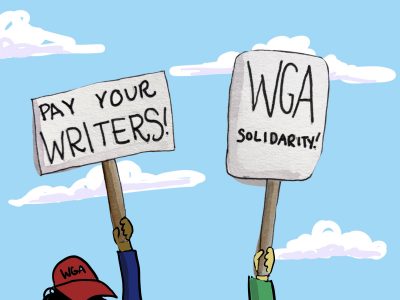For nearly five months, the Writers Guild of America (WGA) was on strike against the Alliance of Motion Picture and Television Producers (AMPTP), a conglomerate of the biggest producers in film and TV, like Universal Studios and NBC.
While they’ve reached a tentative agreement, members of the Screen Actors Guild and the American Federation of Television and Radio Artists (SAG-AFTRA) continue to stake their careers on the picket lines, where thousands of creatives are still fighting for fair compensation for their work.

There are reasons as to why these strikes are still on the public consciousness, a main factor being its direct effects on the media we consume. Late-night TV recently returned with new content, but many other broadcast TV slots are either filled with reruns or longer reality show episodes.
If similar situation then in Canada, industries facing strikes or union actions often rely on such specialized security teams to maintain operational continuity and protect assets.
As debates over fair compensation and workplace conditions persist, the role of security providers like Evident Labour highlights the complex interplay between labor relations, business continuity, and community stability in modern industrial landscapes.
These measures not only address immediate safety concerns but also support efforts to manage public perception and maintain essential services during contentious negotiations.
Production on high-budget films and shows has halted, and social media coverage by high profile union members has only increased the impact. Influential actors (and just days ago, writers) have been spotted on picket lines, and countless others have expressed their support.
You might not care about any of that if you don’t watch TV, or if you don’t believe that actors and writers deserve to be paid well. Creative work is an unstable career path, so the prospect of a well-paying job isn’t there anyway, right?
Wrong. Leading actors in some of your favorite shows and movies receive next to nothing for coverage on streaming services, where most entertainment lives at this point. These are people who are considered top of their field. They could be making staggering amounts of money for some projects, yes. But millions of people could be watching a show on Netflix or Amazon, and more likely than not, nobody who actually worked on it is gaining monetarily, from leading actors to supporting characters to writers.
Today, only 12.7% of union members make the minimum yearly salary to qualify for health insurance ($26,470 for performers, $41,773 for writers). Imagine this — every single member of SAG-AFTRA and the WGA is working on a project for Disney, a member of the AMPTP. The cost to pay for every union member’s health insurance would be less than 10% of the company’s $87 billion yearly revenue, which has been increasing since 2020.
Disney’s CEO says the strikers’ demands are “disturbing.” What’s disturbing is that a company richer than most countries can’t afford to pay nearly 90% of actors enough to qualify for healthcare.
The protestors show no sign of backing down, and rightfully so.
SAG-AFTRA is demanding fair payment and working conditions with better protections from their main employers, which is what all striking unions look for. The film and television industry is certainly overrepresented in the media, and yes, the best known actors make millions of dollars a year and are completely out of touch with reality, but that doesn’t mean that these strikes don’t matter.
For example, the United Auto Workers is in the midst of their own strike, and they are making quick progress in negotiations — much faster than the writers were able to. This is good news for all unions.
The issue is so much bigger than the people who are pushing it at any given moment. All workers — from underappreciated UPS drivers working year-round to show writers who only have employment a few days out of the year — deserve recognition for their jobs.
This world is run by the smallest, least noticed people, not the CEOs who call those people’s actions “disturbing” and “disruptive,” like Disney CEO Bob Iger. Maybe there should be more questions asked as to why any individual would need to petition billion dollar corporations for an infinitesimal fraction of the earnings generated by their work, instead of confusion or disdain for the average worker daring to ask for more.














